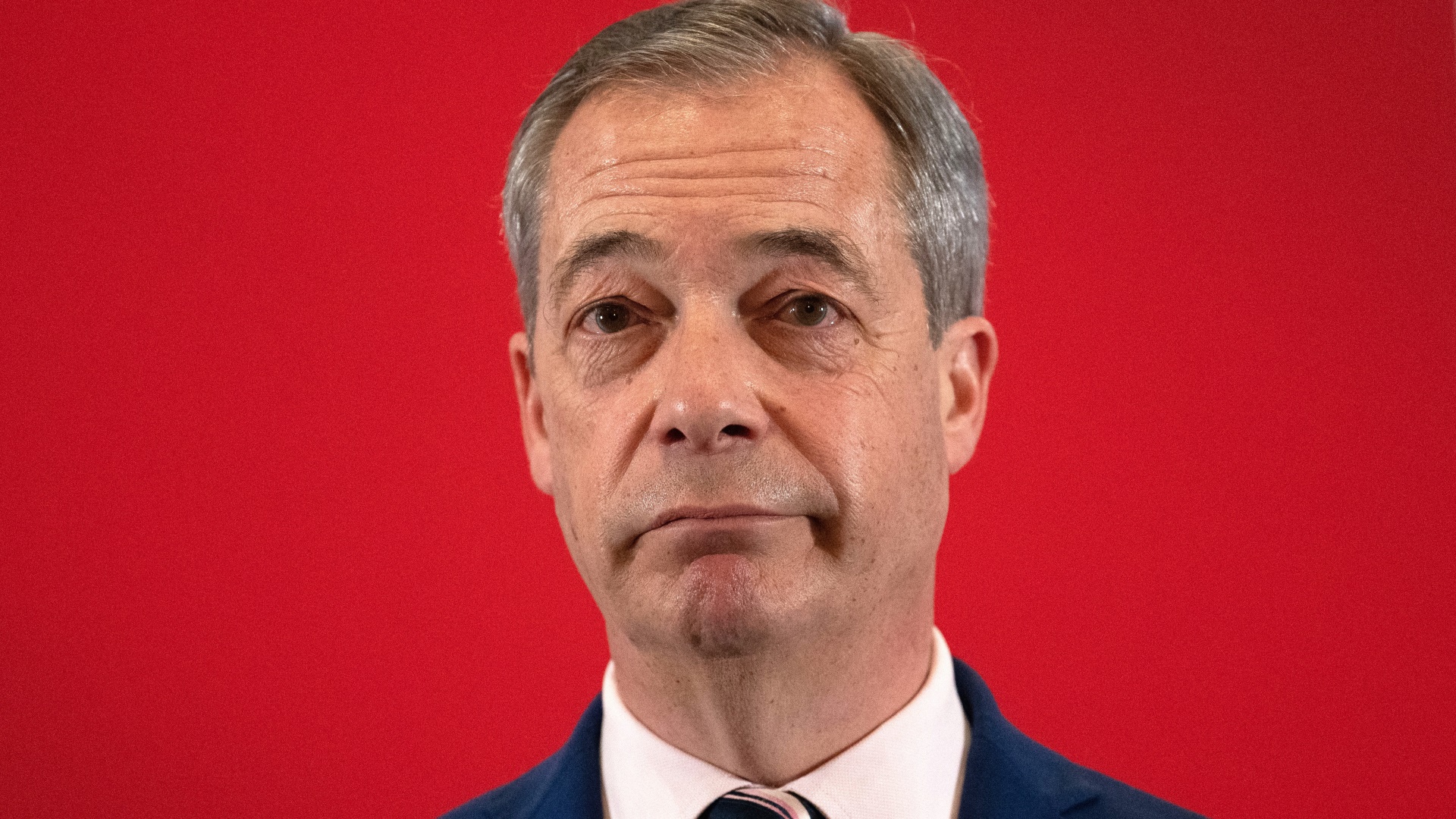As you make clear in Lie of the Week (TNE #350), the most regrettable thing about the NatWest/Coutts saga is that it has thrust Nigel Farage back into the limelight. Let’s hope this dies down very quickly so he returns to the margins where he belongs. Put Farage back in the garage and lock the door.
Phil Green
James Ball (TNE #349) describes the Church of Scientology as a cult-like pseudo-religion. Church member Karin Pouw, however, calls this reckless bigotry, hate propaganda and disinformation (Letters, TNE #350). Surely the acid test is whether Coutts Bank would give them an account?
Ed Lewis
Potters Bar, Hertfordshire
I am sure you must be aware of the massive inconvenience caused to UK expats living in Europe due to having their UK bank accounts closed following changes to banking passporting rules as a result of Brexit
My husband and I moved to Italy last October. Following our notification of change of address, our bank Coutts informed us that our account would be closed in two months. As we were still waiting for Italian residence this caused us massive inconvenience, as well as the need to find a solution for our ongoing UK receipts.
The irony that Mr Farage, who caused us all these problems, is now claiming to be the champion of the “debanked” is mind-bending. Should we ask him for an apology for causing the reason for our account to be closed or do we seek compensation from Coutts for being “too European”?
Francesca Bennison Short
The statement from Coutts that they closed Nigel Farage’s accounts for commercial reasons seems to be true.
If Farage had not fallen below their wealth criteria his account would not have been flagged for closure. Coutts then had to decide whether there was a commercial case for continuing the account on a discretionary basis. Since granting a discretionary account on this basis implies the bank’s support for his political views – possibly with reputational (commercial) repercussions for the bank – surely not doing him a favour was also a commercial decision?
Peter Basford
Now Nigel Farage has received an apology from his bank for deleting his account, is it not time for Nigel Farage to apologise for Brexit?
Patrick Maskell
Bexhill, East Sussex
Suella’s way
I would go further than Bonnie Greer, and suggest that to believe Suella Braverman should have more empathy for migrants because of her skin colour is in itself racist (“We’re wrong about race and the right”, TNE #350).
White disappointment in a person of colour who does not behave in the way that white people think they should is a very ugly thing to behold.
Jane Spark
Oxford, Oxfordshire
Suella Braverman should have softer views on migration because of empathy and compassion. Which she seems to lack. Nothing to do with the colour of her skin, it’s to do with her character.
Siobhan Starr
Via Facebook
Not touched on by Bonnie Greer is that Braverman and Priti Patel might want or need to be seen to be tougher on migration simply because Tory selection committees and Tory voters would expect them to be softer on the issue as the children of migrants.
Peter Church
No quick fix
Patience Wheatcroft’s suggestion that we “Take a lead out of the Farage playbook and start shouting about Rejoin” (TNE #350) has the virtue of being positive and principled. However, it is worth recognising that Ukip’s precursor was founded in 1991; the Brexit referendum vote was a full 25 years later. This route is no more of a quick fix than other, more gradualist proposals.
Anthony Thacker
Hinckley, Leicestershire
Labour’s stand
The scramble by both larger parties to distance themselves from pro-environmental measures after the Uxbridge by-election has made me wonder anew at what Labour actually stands for now and whether Keir Starmer (“Starmer’s Cash-22, TNE #350) has the courage to define his party as distinct from Tory populism.
Since becoming leader Starmer has consistently contrived to appeal to Brexiteers, seemingly at the expense of his own beliefs.
I grew up thinking that a political party should put forward a manifesto expressing their ideas for running the country, based on a set of principles. It was then the job of the party politicians to convince voters that their ideas would work, thereby benefiting said voters. Since the referendum, this seems to have been supplanted by the idea that politicians are simply a combination of mirror and mouthpiece for popular opinion.
By all means listen to people, but MPs are elected because they are trusted to do what is right for the country. This was not, as many knew – including Starmer – leaving the EU. Nor, whatever the rights and wrongs of the ULEZ policy per se, is prevaricating on ways to minimise climate change.
Winning power is difficult, but retaining it when you have sacrificed your integrity in full view of a country that is declining, cynical, shuns immigrants and is failing to mitigate major changes in its climate is going to be almost impossible.
Alison Rees
Ex-Labour, now Liberal Democrat district and town councillor, Mid-Sussex
Jonty Bloom’s article misses a vital point. Global warming means that we need now to manufacture millions of cars, buses and coaches powered by hydrogen, green methane and electricity. Only rejoining the single market will enable Starmer to get the investment to begin the much-needed new green industrial revolution.
David Hogg
Bristol, Avon
Have I got this right? Nigel Farage tells us that “Brexit has failed”. Brexit cheerleaders like the Express, Mail and Telegraph are slowly and grudgingly beginning to admit that something has gone wrong with their precious Brexit.
The Tories got us into this mess by making extravagant promises and Starmer is going to get us out of it by repeating the same extravagant and now discredited promises.
Don Adamson
Bradford, West Yorkshire
Hiding place
David Murray’s observation on PR (Letters, TNE #350) demonstrates the classic blind spot from which defenders of First Past the Post suffer. He uses a 2% polling figure for the far right in the 2019 UK election as proof that proportional representation amplifies minority extremist parties.
FPTP generates a system in which two major parties dominate. Yet these are large coalitions of broad left and right. Thus the 2% figure given to support for far right parties in Britain entirely ignores the far right faction sitting inside the Conservative Party.
With the expulsion of moderate Tories by Boris Johnson, the far right is now in control of the government without being clearly and openly identified for what they are. In PR they would exist, but their involvement in any coalition would be visible.
First Past the Post does not prevent parties with extremist policies getting into power; it merely hides them.
Paul Stein
Pickering, North Yorkshire
Sporting strife
Alastair Campbell (Diary, TNE #350) says his research insists that hurling is the national sport of Northern Ireland. I’m afraid that’s unlikely to be so – hurling is very much a minority sport, behind Gaelic football, soccer and maybe rugby.
By the way, my father played in midfield on the only occasion Donegal won the Ulster Championship in hurling. No team from Ulster has ever won the All-Ireland Hurling Championship although, in 1901, London beat Cork to take the title.
Hugh Varilly
Tide of change
In his letter (TNE #350), Brian Pollard misses a vital source of green energy. One that is underfunded and underdeveloped yet is 100% constant: tidal power.
How about building giant undersea turbines in the Channel, and tidal barrages? This would be completely pollution-free and would not have the same decommissioning problems as nuclear power.
Richard Scales
Norwich, Norfolk
On song
I was pleased and surprised to read the article about Spanish singer Bunbury in your great newspaper (“I am the resurrection”, TNE #350)
Around the turn of the millennium, my late husband and I were staying at a small beach hotel in Ribadesella in northern Spain. It rained for a week and on one night, we stayed in for dinner. A group of about 12 young men and one young woman were also there eating, drinking and generally enjoying themselves. We speculated who they could be – a works outing, a club? – but no, we found out that they were Bunbury’s band.
When we had retired to the bar one of the young men came to apologise for the noise and offered to buy us a drink. My partner, ever the gentleman, insisted on buying drinks for the group. This went on until the early hours. I had the good sense to stop after a while but not my partner. It was a wonderful evening.
The following day we were given memorabilia and a CD for our heavy metal-loving daughter. Needless to say, when we went to pay the bill on leaving it had been settled.
Claire Sullivan
Skirting issue
Considering the current heatwave around the Mediterranean, Will Self’s article about men wearing skirts (TNE #350) is very topical. I can see a lot of sense in any clothing that helps to keep the nether parts cool. As long as decency is preserved, people should wear what they like.
Sadly, it is unlikely that male skirt-wearing will make it into the street. We seem to have moved into a new puritanism about male clothing. Look at the beach and the swimming pool; the men will almost all be wearing shorts down to the knee.
I have to say that I prefer to swim without carrying a gallon of water, and I like to catch the sun, but am wary of social disapproval. Perhaps, as a country gets poorer, there is a tendency to cover up more. Is Brexit to blame?
John Ball
Best Boneys
Re: “Napoleon Dynamite”, Richard Luck’s piece on screen interpretations of Bonaparte, (TNE #350). Concerning comedic interpretations, that by James Tolkan, who Woody Allen makes a bungled attempt to assassinate in his shamefully neglected Love and Death (1975) is perhaps worth a mention.
Richard Chatten
Crystal Palace, London
Waning lyrics
I enjoyed the reminder of Morrissey’s dreadful lyrics for The Bullfighter Dies in your quiz (TNE #350). Readers who managed to work out “mad in Madrid, ill in Seville, lonely in Barcelona” but are happily unfamiliar with the song might like to know that the lyrics in the second verse are even worse.
They are: “gaga in Málaga, no mercy in Murcia, mental in Valencia”. The Valencia “rhyme” alone sounds to me like a once-great lyricist giving up, which I dearly wish Morrissey would.
Billy Furious
Whalley Range, Manchester
Cheesy
Yet again another gem of a read from Peter Trudgill (“Wealds, wolds and woods”, TNE #349). While it was excellent on Angle- and Saxon-derived place names, it also made me nostalgic for Lymeswold cheese, RIP. I can’t be the only one who misses it!
Joe McLaughlin
Bonnyrigg, Midlothian



